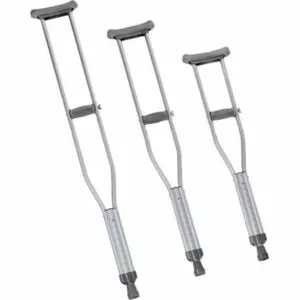Tibia Fracture
Updated:
(Also known as Tibial Fracture, Fractured Tibia, Fractured Medial Malleolus, Broken Tibia)
What is a tibia fracture?
A tibia fracture is a condition involving a break in the larger of the long bones of the lower leg, known as the tibia (shin bone – figure 1).
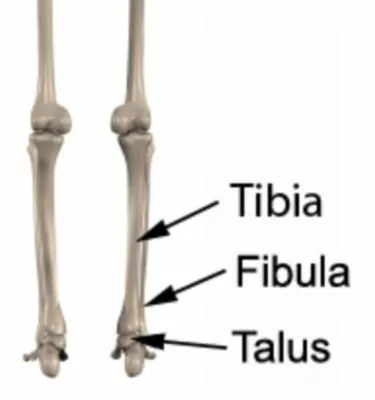
The lower leg comprises of 2 long bones, known as the tibia and the fibula, which are situated beside each other (figure 1). The tibia bone lies on the inner aspect of the lower leg and forms joints with the femur (at the knee), the fibula (near the knee and at the ankle) and the talus in the ankle (figure 1).
During certain activities such as landing from a jump, a forceful impact to the front / inner aspect of the lower leg or ankle, or, when rolling an ankle, stress is placed on the tibia bone. When this stress is traumatic, and beyond what the bone can withstand, a break in the tibia may occur. This condition is known as a tibia fracture.
Because of the large forces required to break the tibia bone, a tibia fracture often occurs in combination with other injuries such as a dislocated or sprained ankle or other fractures of the foot, ankle or lower leg.
Tibia fractures can vary in location, severity and type including avulsion fracture, stress fracture, Potts’ fracture, medial malleolus fracture, displaced fracture, un-displaced fracture, compound fracture, greenstick, comminuted etc.
Causes of a tibia fracture
A tibia fracture often occurs in association with a rolled ankle particularly with significant weight bearing forces. They may also occur due to an awkward landing from a jump (particularly on uneven surfaces), due to a fall, during a motor vehicle accident, or, following a direct blow to the front or inner aspect of the lower leg or ankle.
Tibia fractures occasionally occur in running and jumping sports involving change of direction such as football, soccer, rugby, basketball and netball. A stress fracture to the tibia, may occur as a result of overuse often associated with a recent increase or high volume of running.
Signs and symptoms of a tibia fracture
Patients with a tibia fracture typically experience a sudden onset of sharp, intense lower leg or inner ankle pain at the time of injury. This often causes the patient to limp so as to protect the tibia. In severe cases, particularly involving a displaced fracture of the tibia, weight bearing will be impossible. Pain is usually felt on the front or inner aspect of the lower leg or ankle. Occasionally this can settle quickly with rest leaving patients with an ache at the site of injury that may be particularly prominent at night or first thing in the morning. Occasionally patients may experience symptoms in the calf region.
Patients with a tibia fracture may also experience swelling, bruising and pain on firmly touching the affected region of bone. Pain may also increase during certain movements of the foot, ankle or knee, when standing or walking (particularly up or down hills or stairs, on uneven surfaces or when carrying heavy objects) or when attempting to stand or walk. In severe tibia fractures (with bony displacement), an obvious deformity may be noticeable. Occasionally patients may also experience pins and needles or numbness in the lower leg, foot or ankle.
Diagnosis of a tibia fracture
A thorough subjective and objective examination from a physiotherapist or doctor is essential to assist with diagnosis of a tibia fracture. An X-ray is usually required to confirm diagnosis and assess the severity of the fracture. Further investigations such as an MRI, CT scan or bone scan may be required, in some cases, to assist with diagnosis and assess the severity of the injury.
Treatment for a tibia fracture

Members Only ContentBecome a PhysioAdvisor Member to gain full access to this exclusive content. For more details see Become a Member. Already a member? Login Now
Prognosis of a tibia fracture
Patients with a tibia fracture usually make a full recovery with appropriate management (whether surgical or conservative). Return to activity or sport can usually take place in a number of weeks to many months and should be guided by the treating physiotherapist and specialist.
In patients with severe injuries involving damage to other bones, soft tissue, nerves or blood vessels, recovery time may be significantly prolonged. In patients with only very minor fractures that are un-displaced (such as an avulsion fracture of the medial malleolus) return to sport can sometimes occur in as little as 6 – 8 weeks as guided by the treating physiotherapist.
Physiotherapy for a tibia fracture
Physiotherapy treatment and in particular appropriate rehabilitation, is vital in all patients with a tibia fracture to hasten healing and ensure an optimal outcome. Treatment may comprise:
- soft tissue massage
- joint mobilization
- electrotherapy (e.g. ultrasound)
- taping or bracing
- ice or heat treatment
- the use of a protective boot or brace
- the use of crutches
- exercises to improve strength, flexibility and balance
- hydrotherapy
- education
- activity modification
- a graduated return to activity plan
- footwear advice
- the use of orthotics
Other intervention for a tibia fracture
Despite appropriate physiotherapy management, some patients with a tibia fracture do not improve adequately and may require other intervention. The treating physiotherapist or doctor can advise on the best course of management when this is the case. This may include further investigations such as X-rays, CT scan, MRI or bone scan, periods of plaster cast immobilization or referral to appropriate medical authorities who can advise on any intervention that may be appropriate to improve the fractured tibia. Occasionally, patients with fractures that are initially managed without surgical intervention may require surgery to stabilize the fracture and a bone graft to aid fracture healing.
Exercises for a tibia fracture
The following exercises are commonly prescribed to patients with a tibia fracture following confirmation that the fracture has healed or that pain free mobilization can commence as directed by the surgeon. You should discuss the suitability of these exercises with your physiotherapist prior to beginning them. Generally, they should be performed 3 times daily and only provided they do not cause or increase symptoms.
Your physiotherapist can advise when it is appropriate to begin the initial exercises and eventually progress to the intermediate, advanced and other exercises. As a general rule, addition of exercises or progression to more advanced exercises should take place provided there is no increase in symptoms.
Initial Exercises
Ankle Up & Down
Begin this exercise in a position allowing free movement of your foot and ankle (figure 2). Gently move your ankle up and down as far as you can go without discomfort. Ensure you feel no greater than a mild to moderate stretch during the exercise. Perform 10 – 20 repetitions provided there is no increase in pain.
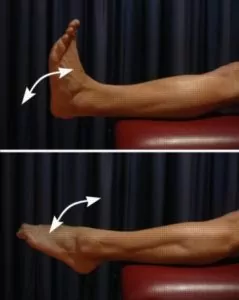
Ankle In & Out
Begin this exercise in a position allowing unrestricted movement of your foot and ankle. Gently move your ankle and foot in and out as far as you can go without discomfort. Ensure you experience no greater than a mild to moderate stretch during the exercise (figure 3). Repeat 10 – 20 times provided there is no increase in pain.
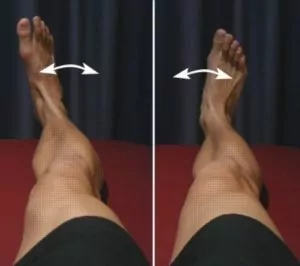
Ankle Circles
Commence this exercise in a position allowing free movement of your ankle and foot. Gently, move your ankle and foot in a circle as far as you can go without pain (figure 4). Ensure you feel no more than a mild to moderate stretch during the exercise. Repeat 10 times both clockwise and counter-clockwise provided there is no increase in symptoms.
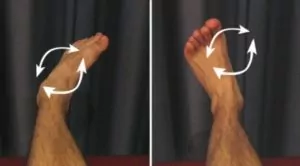

Members Only ContentBecome a PhysioAdvisor Member to gain full access to this exclusive content. For more details see Become a Member. Already a member? Login Now
Intermediate Exercises

Members Only ContentBecome a PhysioAdvisor Member to gain full access to this exclusive content. For more details see Become a Member. Already a member? Login Now
Advanced Exercises

Members Only ContentBecome a PhysioAdvisor Member to gain full access to this exclusive content. For more details see Become a Member. Already a member? Login Now
Other Exercises

Members Only ContentBecome a PhysioAdvisor Member to gain full access to this exclusive content. For more details see Become a Member. Already a member? Login Now
Rehabilitation Guide for a Tibia Fracture

Members Only ContentBecome a PhysioAdvisor Member to gain full access to this exclusive content. For more details see Become a Member. Already a member? Login Now
 Physiotherapy products for a tibia fracture
Physiotherapy products for a tibia fracture
Some of the most commonly recommended products by physiotherapists to hasten healing and speed recovery in patients with a tibia fracture include:
-
 Wheat Bags
Wheat Bags -
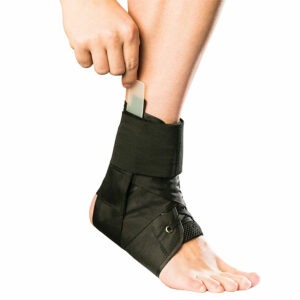 AllCare Ortho Total Ankle Brace (AOA19)
AllCare Ortho Total Ankle Brace (AOA19) -
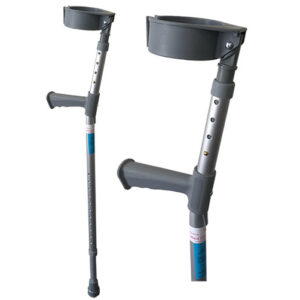 Forearm Crutches Adjustable – Standard Grip
Forearm Crutches Adjustable – Standard Grip -
 AllCare Wobble Board (Red – ACWOBRD)
AllCare Wobble Board (Red – ACWOBRD) -
 AllCare Band
AllCare Band -
 AllCare Tubing
AllCare Tubing -
 AllCare Spikey Massage Ball
AllCare Spikey Massage Ball -
 AllCare Instant Cold Pack (15 x 25cm)
AllCare Instant Cold Pack (15 x 25cm) -
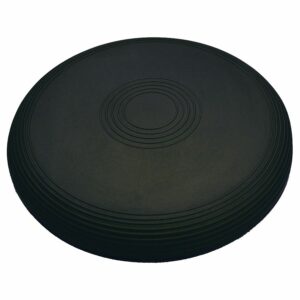 Lournet Stability Dura Disc
Lournet Stability Dura Disc -
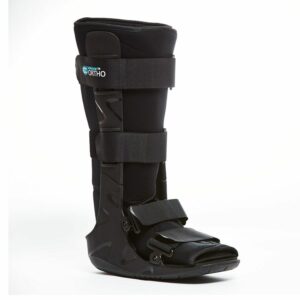 AllCare Ortho Standard Walker (Cam Boot)
AllCare Ortho Standard Walker (Cam Boot) -
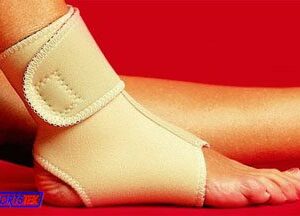 Thermoskin Heat Retaining Ankle Wrap
Thermoskin Heat Retaining Ankle Wrap
To purchase physiotherapy products for a tibia fracture click on one of the above links or visit the PhysioAdvisor Shop.
 Find a Physio
Find a Physio
Find a Physiotherapist in your local area who can treat a tibia fracture.
 More information
More information
- Ankle Stretches.
- Ankle Strengthening Exercises.
- Knee Flexibility Exercises.
- Knee Strengthening Exercises.
- Leg Stretches.
- Leg Strengthening Exercises.
- Balance Exercises
- How to use Crutches
- Ice or Heat
- R.I.C.E. Regime.
- Return to Running Program.
- Return to Sport.
- Why is my Injury not Improving?
- Ankle Taping.
- Lower Leg Diagnosis Guide.
Become a PhysioAdvisor Member

Link to this Page
If you would like to link to this article on your website, simply copy the code below and add it to your page:
<a href="https://physioadvisor.com.au/injuries/lower-leg/tibia-fracture”>Tibia Fracture – PhysioAdvisor.com</a><br/>PhysioAdvisor offers detailed physiotherapy information on a Tibia Fracture including: symptoms, causes, diagnosis, treatment, exercises, physiotherapy products and more...
Return to the top of Tibia Fracture.

